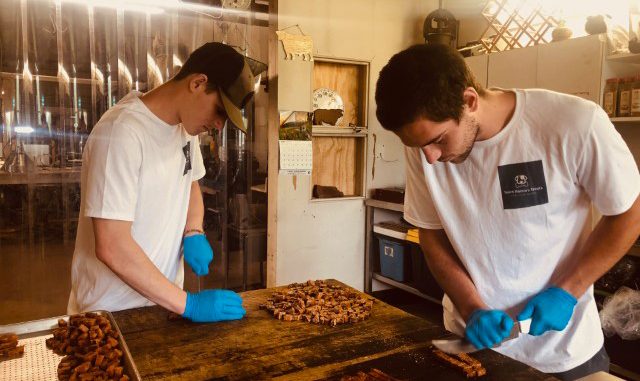
After losing their internships during the COVID-19 pandemic, brothers Kaleb and Kolby Rush decided to start their own business.
“We’ve always had an interest in entrepreneurship, [it’s] something we’ve always loved,” said Kaleb Rush, a junior supply chain management major. “We took two months and really created a business plan and, from there, we were like, ‘Hey, this could really work,’ and we went for it.”
In May 2020, Kaleb and Kolby Rush, a 2021 Pennsylvania State University alumnus, opened Saint Rocco’s Treats, named after Saint Rocco, the patron saint of dogs.
The company makes, ships and sells handmade, high quality dog treats to more than 30 stores in Bucks County, Pennsylvania.
Treats are made in a commercial kitchen everyday and are delivered to customers and stores on Sundays. Currently, they make 120 pounds of finished product each week, Kaleb Rush said.
St. Rocco’s products include chicken and beef treats. For every one pound of treats purchased, the brothers donate $1 to local dog rescues, like Logan’s Heroes Animal Rescue.
The Rush brothers researched the dog treat industry and became dissatisfied with the products sold in stores because the ingredients weren’t high quality, Kaleb Rush said. To ensure their products are healthy for dogs they use ingredients like potato flour, olive oil, rolled oats and human-grade chicken and beef, Rush said.
Opening a business during the pandemic was difficult because social distancing protocols restricted potential employees from working closely together, Kaleb Rush said.
For the first year of business the brothers had to do all the work themselves, including promoting their company on social media and making the dog treats, Kaleb Rush said. The brothers faced many obstacles when trying to create a recipe and solidify a system for their business to operate efficiently.
“It definitely was a struggle, we went through a lot of ups and downs,” Kaleb Rush said.
Before this semester, Kaleb Rush navigated work and school from behind a computer screen and now finds it difficult to multitask as in-person activities resume. Some days he spends almost eight hours attending classes which makes it hard to juggle business responsibilities, he said.
Now that he’s back on campus, Kaleb Rush plans to recruit students to intern at his company, he said. The brothers also plan to attend the Greater Philadelphia Pet Expo, an event where companies introduce their products to pet owners and pet enthusiasts, in October to promote their brand.
The brothers’ goal is to open a dog kitchen cafe in the next two years where people can get freshly made food and treats for their dogs, Kaleb Rush said.
Kaleb Rush reached out to Katherine Nelson, a resource management professor, in Fall 2019 seeking advice on how to move forward with starting a business, and she referred him to Temple University’s Innovation & Entrepreneurship Institute, which works with students and alumni to develop and launch their businesses.
Nelson is proud of Kaleb Rush’s success and impressed with his attitude toward life, she said.
“When life hands you lemons, make lemonade, and he and his brother made lemonade,” Nelson said. “Look at what they’ve done, it’s just amazing.”
Greg Fegley, director of accelerator programs for the Innovation & Entrepreneurship Institute, showed Kaleb Rush useful resources like Startup Tree, a software Temple offers that connects students with mentors and investment groups.
Kaleb Rush worked with Fegley to find their target audience and compete with other dog treat businesses, Fegley said.
Fegley is looking forward to meeting Kaleb Rush in person for the first time after talking with him through Zoom about his business. He is proud that even through the pandemic, Kaleb Rush was able to continue to grow his business.
“In the times of COVID, you’ve really got to take your hat off to young entrepreneurs who have stuck it out, kept at it and don’t take no for an answer, and who continue to just push because they believe in their business,” Fegley said.
While COVID-19 posed a lot of challenges for small businesses, Kaleb Rush saw it as an opportunity to learn and grow as an entrepreneur, he said.
“It’s definitely high stress, and a lot of work, but I love it more than anything,” Kaleb Rush said.


Be the first to comment